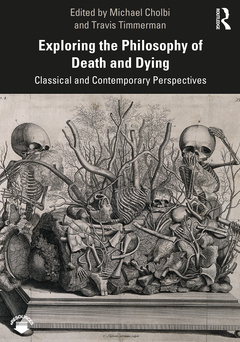Description
Exploring the Philosophy of Death and Dying
Classical and Contemporary Perspectives
Coordinators: Timmerman Travis, Cholbi Michael
Language: English
Subject for Exploring the Philosophy of Death and Dying:
Keywords
Brain Death; Holding; Philosophical issues; Death And Dying; Best Life; Overwhelms homeostasis; Epic Of Gilgamesh; Human mortality; Follow; Epicureanism; Living; Wo; Violates; Worthwhile; Ill; Odd; Irreversible Cessation; Strong; Immortal Life; Epicurean Argument; Person’s Death; Live Forever; Duplicates; Determination Of Death; Destiny; Deprivationist Accounts; Confer; Uploaded; Inclined
Publication date: 12-2020
· 17.8x25.4 cm · Paperback
Publication date: 12-2020
· 17.8x25.4 cm · Hardback
Description
/li>Contents
/li>Biography
/li>
Exploring the Philosophy of Death and Dying: Classical and Contemporary Perspectives is the first book to offer students the full breadth of philosophical issues that are raised by the end of life. Included are many of the essential voices that have contributed to the philosophy of death and dying throughout history and in contemporary research. The 38 chapters in its nine sections contain classic texts (by authors such as Epicurus, Hume, Nietzsche, and Schopenhauer) and new short argumentative essays, specially commissioned for this volume, by world-leading contemporary experts.
Exploring the Philosophy of Death and Dying introduces students to both theoretical issues (whether we can survive death, whether death is truly bad for us, whether immortality would be desirable, etc.) and urgent practical issues (the ethics of suicide, the value of grief, the appropriate medical criteria for declaring death, etc.) raised by human mortality, enabling instructors to adapt it to a wide array of institutions and student audiences.
As a pedagogical benefit, PowerPoints, discussion questions, and test questions for each chapter are included as online ancillary materials.
PART I When Do We Die? 1 Defining Death: A Report on the Medical, Legal and Ethical Issues in the Determination of Death (Excerpt) 2 Defining Death in a Technological World: Why Brain Death Is Death 3 We Die When Entropy Overwhelms Homeostasis 4 What It Is to Die PART II Can We Survive Our Death? 5 The Tragic Sense of Life (Excerpts) 6 Can We Survive Our Deaths? 7 The Possibility of an Afterlife PART III Can Death Be Good or Bad for Us? If So, When Is It Good or Bad for Us? 8 Letter to Menoeceus 9 Two Arguments for Epicureanism 10 Why Death Is Not Bad for the One Who Dies 11 Death Is Bad for Us When We’re Dead 12 Making Death Not Quite as Bad for the One Who Dies PART IV Can Lucretius’ Asymmetry Problem Be Solved? 13 On the Nature of Things (Excerpts) 14 If You Want to Die Later, Then Why Don’t You Want to Have Been Born Earlier? 15 Coming Into and Going Out of Existence PART V Would Immortality Be Good for Us? 16 The Epic of Gilgamesh (Excerpts) 17 The Story of the Man Who Did Not Wish to Die 18 How to Live a Never-Ending Novela (Or, Why Immortality Needn’t Undermine Identity 19 Taking Stock of the Risks of Life without Death 20 Immortality, Boredom, and Standing for Something PART VI What Is the Best Attitude to Take Toward Our Mortality? 21 Death, Mortality, and Meaning 22 Fitting Attitudes Towards Deprivations 23 The Enchiridion (Excerpts) 24 Setting the Wheel of Dhamma in Motion (Excerpts) 25 Voluntary Death PART VII How Should We React to the Deaths of Others? 26 Letter to Lucilius 27 Why Grieve? 28 The Significance of Future Generations 29 Death and Survival Online PART VIII Is Suicide Rationally or Morally Defensible? 30 Whether One Is Allowed to Kill Oneself 31 Of Suicide (Excerpts) 32 Suicide is Sometimes Rational and Morally Defensible 33 Suicide and Its Discontents 34 An Irrational Suicide? PART IX How Does Death Affect the Meaningfulness of Our Lives? 35 World as Will and Representation (Excerpts) 36 Death in Mind: Life, Meaning, and Mortality 37 Meaning in Life in Spite of Death 38 Out of the Blue into the Black: Reflections on Death and Meaning
Michael Cholbi is Chair in Philosophy at the University of Edinburgh and the founder of the International Association for the Philosophy of Death and Dying. His publications include Suicide: The Philosophical Dimensions (2011), Immortality and the Philosophy of Death (2015), and Grief: A Philosophical Guide (2021).
Travis Timmerman is Assistant Professor of Philosophy at Seton Hall University and executive committee member of the International Association for the Philosophy of Death and Dying. He specializes in the philosophy of death, normative ethics, and applied ethics. He has been the recipient of a National Endowment of the Humanities grant and co-recipient of an Immortality Project grant for his work in ethics and death respectively.
These books may interest you

Death, Immortality, and Eternal Life 160.25 €


